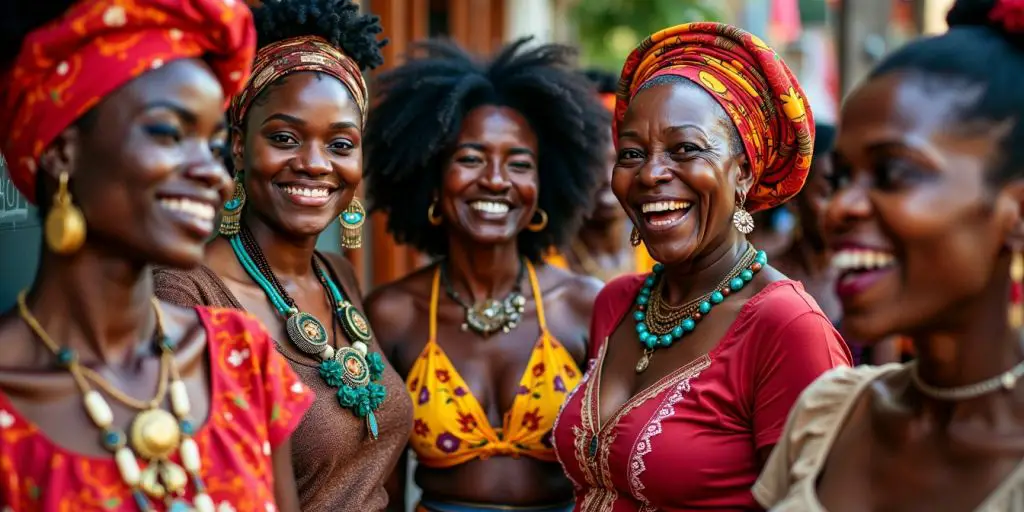Cultural heritage plays a vital role in shaping the identities of Black women. It connects us to our past, strengthens our self-love, and inspires us to embrace our roots. This article explores how understanding and celebrating our cultural heritage can lead to self-discovery, healing, and empowerment.
Key Takeaways
- Cultural heritage helps Black women discover their identity and self-worth.
- Nature serves as a powerful tool for spiritual healing and connection to ancestors.
- Honoring ancestors through rituals strengthens family and community bonds.
- Preserving African cultural heritage is essential for future generations.
- Celebrating the contributions of Black women enriches our cultural narrative.
Embracing Cultural Heritage: A Path to Self-Discovery

Understanding the Importance of Cultural Heritage
Cultural heritage is a vital part of who we are. It helps us understand our roots and gives us a sense of belonging. By embracing our heritage, we can find strength and pride in our identity. This connection to our past can guide us in our journey of self-discovery.
Personal Stories of Rediscovery
Many Black women have shared their journeys of rediscovering their cultural heritage. Here are some common themes:
- Family Traditions: Learning about family recipes and customs.
- Cultural Events: Participating in festivals and celebrations that honor our history.
- Art and Music: Exploring traditional art forms and music that reflect our culture.
The Role of Cultural Heritage in Self-Identity
Cultural heritage plays a significant role in shaping our self-identity. It helps us:
- Connect with our ancestors: Understanding their struggles and achievements.
- Challenge stereotypes: By showcasing the richness of our culture, we can break down misconceptions.
- Foster community: Building relationships with others who share similar backgrounds.
Embracing our cultural heritage is not just about looking back; it’s about moving forward with pride and purpose.
In summary, embracing our cultural heritage is a powerful path to self-discovery. It allows us to connect with our past, understand our present, and shape our future. By celebrating our roots, we empower ourselves and inspire others to do the same.
Nature as a Bridge to Ancestral Wisdom
Connecting with Nature for Spiritual Healing
Connecting with nature can be a powerful way to heal spiritually. Nature offers a unique comfort that helps us feel closer to our ancestors. When we spend time outdoors, we can reflect on our roots and the wisdom of those who came before us. This connection can be as simple as taking a walk in the park or as profound as participating in ancestral rituals.
Ancestral Practices in Modern Times
Many of us can benefit from incorporating ancestral practices into our daily lives. Here are some ways to honor our heritage:
- Meditation: Spend time in quiet reflection, inviting the spirits of your ancestors to guide you.
- Offerings: Create small offerings of food or flowers in nature as a sign of respect.
- Nature Walks: Take regular walks in natural settings to feel the connection to the earth and your lineage.
The Therapeutic Benefits of Nature
Nature is not just beautiful; it also has therapeutic benefits. Studies show that spending time outdoors can reduce stress and improve mental health. Here’s a quick overview of some benefits:
| Benefit | Description |
|---|---|
| Reduces Stress | Nature helps lower cortisol levels. |
| Boosts Mood | Fresh air and sunlight can improve happiness. |
| Enhances Creativity | Nature can inspire new ideas and perspectives. |
Reconnecting with nature allows us to honor our ancestors and embrace the beauty of our heritage. By doing so, we not only heal ourselves but also strengthen our ties to those who came before us.
In conclusion, nature serves as a bridge to our ancestral wisdom, helping us to reclaim our identity and foster a deeper understanding of who we are. By embracing these connections, we can uplift ourselves and our communities, ensuring that the legacy of our ancestors lives on. Celebrating our roots is essential for personal growth and cultural pride.
The Power of Ancestral Connections
Rituals to Honor Our Ancestors
Connecting with our ancestors is a powerful way to strengthen our identity. Here are some rituals that can help:
- Create an altar with photos and items that represent your ancestors.
- Offer food or flowers as a sign of respect and gratitude.
- Engage in storytelling to share your family history with others.
Ancestral Wisdom in Daily Life
Incorporating ancestral wisdom into our daily routines can enrich our lives. Consider these practices:
- Meditate to connect with your ancestors and seek guidance.
- Practice traditional cooking to honor your heritage.
- Participate in community events that celebrate your culture.
Strengthening Family Bonds Through Heritage
Understanding our roots can help us build stronger family connections. Here are some ways to do this:
- Share family stories during gatherings to keep traditions alive.
- Explore genealogy to learn more about your family tree.
- Celebrate cultural holidays together to foster unity.
Connecting with our ancestors is not just about the past; it’s about shaping our future. By embracing our heritage, we can find strength and guidance in our daily lives. The strength of ancestrality keeps us on our path, reminding us of the power of our history and the importance of honoring those who came before us.
Preserving African Cultural Heritage
The Significance of African World Heritage Sites
Preserving African cultural heritage is essential for many reasons. It helps honor Africa’s rich contributions to the world. From ancient pyramids to vibrant music, Africa has a wealth of cultural treasures that deserve recognition. Here are some key points:
- Cultural Identity: Understanding our roots helps us connect with our identity.
- Global Influence: African culture has shaped art, music, and philosophy worldwide.
- Historical Legacy: Protecting heritage sites ensures future generations can learn from them.
Challenges in Preserving Cultural Heritage
Despite its importance, many heritage sites face threats. Some challenges include:
- Climate Change: Rising temperatures and extreme weather can damage sites.
- Conflict: Wars and unrest can lead to the destruction of cultural landmarks.
- Development: Urbanization often encroaches on historical sites.
Community Efforts in Heritage Conservation
Communities play a vital role in preserving their heritage. Here are some ways they contribute:
- Education: Teaching younger generations about their culture.
- Local Initiatives: Organizing events to celebrate and protect heritage.
- Collaboration: Working with organizations to secure funding and support.
By taking action, we can ensure that our cultural heritage remains alive and vibrant for future generations.
In conclusion, preserving African cultural heritage is not just about protecting the past; it’s about enriching our present and future. We must all play a part in this important journey.
Celebrating Black Women’s Contributions to Cultural Heritage
Historical Figures and Their Legacies
Black women have played a vital role in shaping cultural heritage. Their contributions are often overlooked, yet they have been instrumental in preserving traditions and advocating for rights. Some notable figures include:
- Harriet Tubman: A leader in the Underground Railroad, she helped many escape slavery.
- Zora Neale Hurston: An influential author and anthropologist, she celebrated African American culture through her writings.
- Maya Angelou: A poet and civil rights activist, her works inspire generations to embrace their identity.
Modern-Day Cultural Leaders
Today, many Black women continue to lead in various fields, ensuring that cultural heritage is celebrated and preserved. They include:
- Ava DuVernay: A filmmaker who highlights Black stories in cinema.
- Michelle Obama: An advocate for education and health, she inspires young women to embrace their heritage.
- Beyoncé: A global icon who uses her platform to celebrate Black culture through music and art.
Empowering Future Generations
To ensure the legacy of Black women continues, it is essential to empower future generations. This can be achieved through:
- Education: Teaching young girls about their history and cultural significance.
- Mentorship: Providing guidance and support to help them navigate their paths.
- Community Engagement: Encouraging participation in cultural events and initiatives.
By celebrating the contributions of Black women, we not only honor their past but also inspire future generations to embrace their heritage and identity.

In conclusion, the impact of Black women on cultural heritage is profound and far-reaching. Their stories and achievements remind us of the importance of preserving our roots and celebrating our identity.
Reclaiming Our Roots: The Journey of Self-Love and Acceptance

Overcoming Stereotypes and Misrepresentations
Reclaiming our roots is essential for Black women to overcome the stereotypes that often misrepresent us. By embracing our cultural heritage, we can challenge these narratives and redefine our identities. Here are some ways to do this:
- Educate ourselves about our history.
- Share our stories with others.
- Support each other in our journeys.
The Role of Cultural Pride in Self-Love
Cultural pride plays a significant role in fostering self-love. When we celebrate our heritage, we acknowledge our unique beauty and strength. This pride can:
- Boost our self-esteem.
- Help us connect with our community.
- Inspire future generations to embrace their roots.
Stories of Personal Transformation
Many Black women have shared their journeys of transformation through reconnecting with their roots. These stories often highlight the importance of self-acceptance and love. For instance, one woman found that by engaging with her cultural practices, she could heal from past traumas and embrace her identity fully.
Reclaiming our roots is not just about looking back; it’s about moving forward with confidence and love.
In conclusion, the journey of self-love and acceptance is deeply intertwined with our cultural heritage. By embracing our roots, we can foster a sense of belonging and empowerment that uplifts not only ourselves but also our communities. Cultural pride is a powerful tool in this journey, helping us to navigate the complexities of identity and self-acceptance.
Cultural Heritage and Its Influence on Art and Music
African Influences in Contemporary Art
Art is a powerful way to express cultural identity. Many contemporary artists draw inspiration from their African roots, blending traditional techniques with modern styles. This fusion creates unique pieces that tell stories of heritage and resilience. Art serves as a bridge connecting generations.
- Traditional motifs: Patterns and symbols that reflect African history.
- Materials: Use of natural resources like clay and wood.
- Themes: Exploration of identity, struggle, and celebration.
The Evolution of Music Through Cultural Heritage
Music is another vital aspect of cultural expression. African rhythms and instruments have significantly influenced various music genres worldwide. From jazz to hip-hop, the beats resonate with the spirit of the ancestors.
- Instruments: Drums, mbira, and kora are often used.
- Genres: Jazz, blues, and reggae showcase African roots.
- Cultural messages: Songs often convey stories of struggle and triumph.
Celebrating Diversity in Creative Expressions
Cultural heritage enriches the arts, allowing for a diverse range of expressions. By embracing our roots, we can create a vibrant tapestry of creativity that honors our past while inspiring future generations.
The healing journey of black women through authentic communication and culturally expressive art is a testament to the healing power of openness and creativity.
In conclusion, understanding the influence of cultural heritage on art and music helps us appreciate the depth and richness of our shared human experience. It encourages us to celebrate our roots and recognize the beauty in diversity.
Cultural heritage shapes the way we create and enjoy art and music. It reflects our history, beliefs, and values, influencing artists and musicians in their work. By understanding these connections, we can appreciate the richness of our cultural expressions. Explore more about how cultural heritage impacts creativity on our website!
Conclusion
In conclusion, celebrating our cultural heritage is vital for Black women. It helps us connect with our roots and understand our identity better. By embracing our history, we not only honor our ancestors but also empower ourselves. Nature plays a big role in this journey. Spending time outdoors allows us to reflect and find peace. As we reconnect with the earth and our heritage, we can heal and grow stronger together. Let’s continue to celebrate our culture and support each other in this beautiful journey of self-discovery.
Frequently Asked Questions
Why is cultural heritage important for Black women?
Cultural heritage helps Black women understand their identity and connect with their roots. It allows them to celebrate their history and the strength of their ancestors.
How can I reconnect with my cultural heritage?
You can reconnect by learning about your family’s history, participating in cultural events, and practicing traditions passed down through generations.
What role does nature play in understanding cultural heritage?
Nature can be a source of healing and comfort. Many find that spending time outdoors helps them feel closer to their ancestors and their cultural roots.
What are some ways to honor ancestors?
You can honor your ancestors through rituals, storytelling, or simply by remembering their contributions to your life and culture.
How does cultural heritage influence art and music?
Cultural heritage shapes the themes, styles, and messages in art and music, allowing artists to express their unique backgrounds and experiences.
What challenges do we face in preserving cultural heritage?
Challenges include modernization, loss of traditions, and the impact of climate change on heritage sites, making it essential to actively work towards preservation.

